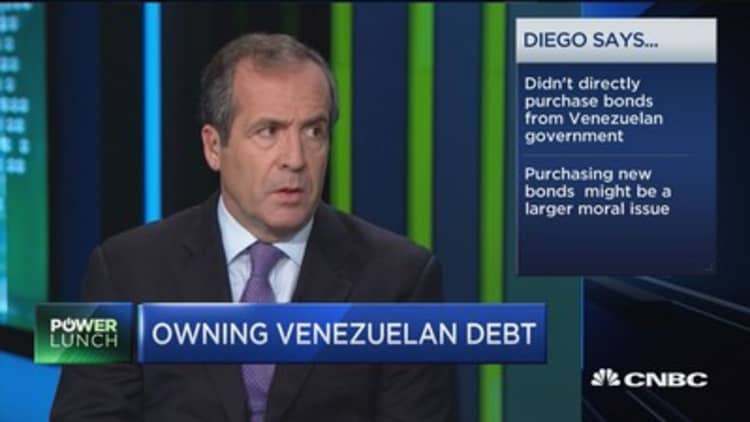Venezuela's President Nicolas Maduro is pressing ahead with a controversial election to form a new government that opponents and analysts fear will damage the country's democracy and allow him to cement his leadership.
The election for the National Constituent Assembly (ANC) will be held on Sunday, July 30, and opposition leaders are planning a week of protests, including a two-day national strike starting on Wednesday, to oppose the election. More than 100 people have died since April in anti-Maduro protests and hundreds more have been injured and arrested, according to Reuters.
The ANC is expected be heavily made up of Maduro supporters, as it over-represents territories and sectors of the economy more likely to support him. Once formed, the ANC will be able to rewrite the country's constitution and will supersede any other legislative body, including the opposition-controlled National Assembly.
"The establishment of an alternative institution would result in the rubberstamping of new laws and effectively eliminate political dissent in the country," Joel Ross, Latin America analyst at global risk consultancy Verisk Maplecroft, told CNBC via email.
"In this context, the July 30 vote would legitimize the executive's encroachment on the separation of powers."

Diego Moya-Ocampos, senior analyst for Americas at IHS Country Risk, predicts the ANC will likely immediately assume the role of and then dissolve the National Assembly.
"The likely decision to proceed with the ANC threatens to have a high political and economic cost in terms of international isolation, sanctions, and casualties from escalating protests, increasing the risk of the Maduro regime collapsing in the two-year outlook," he wrote for IHS Jane's Country Risk report published last week on Thursday.
Moya-Ocampos warns that protests against Maduro are likely to escalate in Caracas and other major cities in the coming months, but the president will likely maintain the support of the country's military. Maduro plans to deploy 232,000 solider on the streets to ensure the election goes ahead, according to Reuters.
Venezuela's economic crisis
While Maduro pursues forming the ANC, Venezuela's crippling economic crisis continues, with shortages of food and basic goods. More than 1.5 million Venezuelans have fled the country because of the crisis, according to Barclays' researchers Alejandro Arreaza, Michael Cohen and Warren Russell, in a commodities research paper published Tuesday.
They warn that if the country collapses, it could become a crisis for the rest of the region.
"This number (of refugees) could increase exponentially, affecting neighboring countries, particularly Colombia. The international community will need to support the region in a refugee crisis," they said.
Alejandro Werner, director of the western hemisphere department at the International Monetary Fund, echoed this warning, adding that Venezuela faces a political and humanitarian crisis made worse by a "prolonged economic recession."
"This political crisis poses significant downside risks for growth if it escalates further or remains unabated for a long period. Inflation is expected to accelerate driven by the monetization of large fiscal deficits and the loss of confidence in the currency," he said in an Americas outlook report published Tuesday.
"If living conditions continue deteriorating, Venezuela's humanitarian crisis could spin out of control, increasing the number of people migrating to neighboring countries."
What is the rest of the world doing about the crisis?
President Trump has been vocal in criticizing Maduro and the ANC. Trump warned last week he would take "strong and swift economic actions" if the election goes ahead. The Trump administration is reportedly considering a wide range of economic sanctions against the country, its senior government officials or the state-owned oil company PDVSA.
Venezuela's economy is highly dependent on selling oil, especially to the U.S., but its oil export revenue is at a 15-year low, according to Barclays' Arreaza, Cohen and Russell. They say even limited U.S. sanctions could cause Venezuela to default on its debt payments and disrupt oil production.
"A sharper and longer disruption (e.g. exceeding three months) could raise oil prices at least $5 to $7 per barrel," they said. "It may be just the opportunity OPEC needs to exit its current strategy."
However, the U.S. energy system relies on Venezuela; offsetting heavy oil supply from the country would be more difficult than offsetting Middle East supply and U.S. refiners would be negatively affected by any sanctions, according to the Barclays' researchers.
The European Union has also called on Maduro to suspend the ANC process. Last week, the foreign affairs council discussed applying specific sanctions against individual Venezuelan leaders, but the EU has so far refrained from taking action.
Sanctions would have mixed results, warns Verisk Maplecroft's Joel Ross.
"Sanctions would hit ordinary Venezuelan families hardest, but they would also increase pressure from the military for Maduro's resignation. This is because reduced revenues from oil exports would shut down Venezuela's access to foreign currency, impacting the distribution of food and medicine that the armed forces control as part of a complex patronage system," he said.
Ross warns that if the ANC goes ahead and chances of a peaceful solution retreat, protestors are more likely to resort to violent means to remove Maduro's government.


